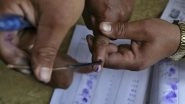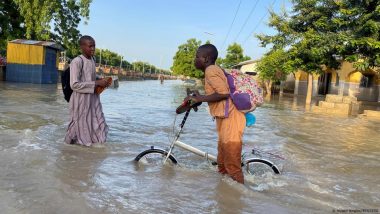A loss and damage fund aimed at offering financial assistance to Global South nations hit by climate disasters will start paying out next year say officials at UN climate talks in Baku.After years of seeing her home country of Uganda hit by the impacts of climate change caused by the burning of fossil fuels, Ireen Twongirwe is angry.
Also Read | Latest News | Municipal Corporations Need to Enhance Own Sources of Revenue: RBI Report.
"You can't predict what is coming, you know? Like you find when it's the season for rain, now sunshine comes in, when it's the season for sunshine, now rain comes in. So, you know, it's hard to predict," said Twongirwe, executive director of the nonprofit Women for Green Economy Movement Uganda.
Also Read | World News | 2 Dead in Explosion at Factory in US.
The unpredictability she describes is destroying crops and livelihoods, which she says leads to "all sorts of conflicts in communities and the country at large" due to price increases.
Prolonged drought in East Africa from 2020 to 2023 was followed by heavy rainfall and severe flooding in 2024, which affected hundreds of thousands of people. Infrastructure was damaged, schools closed and livestock and crops lost.
World Weather Attribution scientists, who investigate the link between
extreme weather events and climate change, have said the heavy rain was made twice as likely and 5% more intense by hotter temperatures linked to the burning of fossil fuels.
And it is by no means a unique story. In some regions, heat waves, droughts, hurricanes and other weather extremes are becoming stronger and more frequent as we warm the planet by emitting greenhouse gas into the atmosphere. Communities in poorer countries that have done the least to contribute to climate change often face the brunt of the impacts of a heating planet.
"The reality is that we hear about them when disaster hits them — for a couple of days or weeks," Harjeet Singh, then head of global political strategy at Climate Action Network International, told DW. "But after that, we all forget about them. We don't provide them enough support to recover from these impacts to rebuild their homes and livelihoods."
'Historical agreement' on loss and damage
After more than a decade of pleas from developing nations for financing to address climate change-caused loss and damage, leaders of the last climate summit in Dubai in 2023 officially launched the fund.
One year later, and more progress has been made.
"The fund for responding to loss and damage is ready to disburse funding," said Ibrahima Cheikh Diong, executive director of the fund, as it was officially signed off in the Azerbaijan capital.
The aim of the new fund, which has been described as a "historic agreement," is to help poorer countries meet the cost of losses and damages linked to increasingly extreme weather. It could also provide money to deal with what are known as "slow onset" impacts, such as rising sea levels, which could see island nations such as the Maldives but also Tuvalu or Barbuda submerged by the end of the century.
Negotiators decided on the fund at the COP27 climate summit in Sharm el Sheikh, Egypt in 2022. But initial meetings broke down in disagreement. One of the main sticking points was around the institution designated to host the fund.
Richer nations like the United States favored the World Bank, but Alpha Kaloga, then Africa head negotiator on loss and damage involved in establishing it in the first place, said developing nations had strong reservations.
"The World Bank is an institution that is excluding many developing countries in terms of eligibility criteria," he said, adding that following extreme events, the bank would give loans to African countries with already high levels of debt. "We think if we have to take loans, it has to be highly concessional."
Historical responsibility for climate change
Assessing the vulnerability of countries eligible to access loss and damage funding following an extreme weather event, and which countries would have to contribute to financing, was a bone of contention.
Developed nations wanted contributions from the oil-rich Gulf states and China, which despite being the world's second-largest economy after the US is categorized as a developing country.
Though China emits more carbon dioxide than any other country, the United States remains the biggest historical emitter. Since 1750, it has spewed almost twice as much CO2 into the atmosphere as China.
"When it comes to legal and moral obligation, that lies with rich countries because of their historical responsibility," said Singh. "But large countries like China or the Gulf nations, that are oil states if they want to donate, can always put money in."
The transitional committee's recommendation presented to COP28 delegates for consideration does not call for a commitment from industrialized countries to pay into the fund, but instead urges them to contribute and encourages developing nations to do the same.
Financial targets for a new fund
Last year the United Arab Emirates, host of the COP28 climate talks, and Germany pledged $100 million (€94 million) each into the fund. Other wealthy nations including France, the US and Denmark have also contributed, with Sweden the most recent nation to chip in with almost $20 million.
The fund is now at $722 million an amount that "doesn't come close to righting the wrong inflicted on the vulnerable" and "is roughly the annual earnings of the world's 10 best-paid footballers", said UN Secretary-General Antonio Guterres.
"It does not even account for a quarter of the damage in Vietnam caused by Hurricane Yagi in September," he said.
Developing nations hope it will reach billions. Flooding caused by heavy rainfall in 2022 in Pakistan led to economic loss and damage valued at $30 billion alone. According to the London School of Economics, loss and damage in developing countries could reach a total of between $290 and $580 billion annually by 2030.
Although public money from richer countries should form the bulk of the new fund, Singh said other "innovative" streams of revenue such as levies on fossil fuel extraction and financial transaction taxes or a tax on business air passengers should also be explored.
Industrialized nations don't have a strong track record. In 2009, they agreed to mobilize $100 billion a year by 2020 to help address the needs of developing countries in a warming world. They didn't reach the target until 2022, which Preety Bhandari, formerly a senior adviser in the Global Climate Program with the World Resources Institute, said had led to a lack of trust.
"If there are going to be shifting goal posts on commitments, as has been the case with the $100 billion financing, then is this entire multilateral venture under threat?" she asked. But Bhandari also stressed the importance of establishing a loss and damage fund.
"We have to try. We can't give up just because there has not been adequate progress. If the issue is not put on the table, if we give up right up front, then the whole battle is lost."
Edited by: Tamsin Walker
This is an updated version of an article originally published in November 2023.
(The above story first appeared on LatestLY on Nov 13, 2024 05:30 PM IST. For more news and updates on politics, world, sports, entertainment and lifestyle, log on to our website latestly.com).













 Quickly
Quickly


